英语易错易混词汇整理
高考英语必考常见易混易错词汇
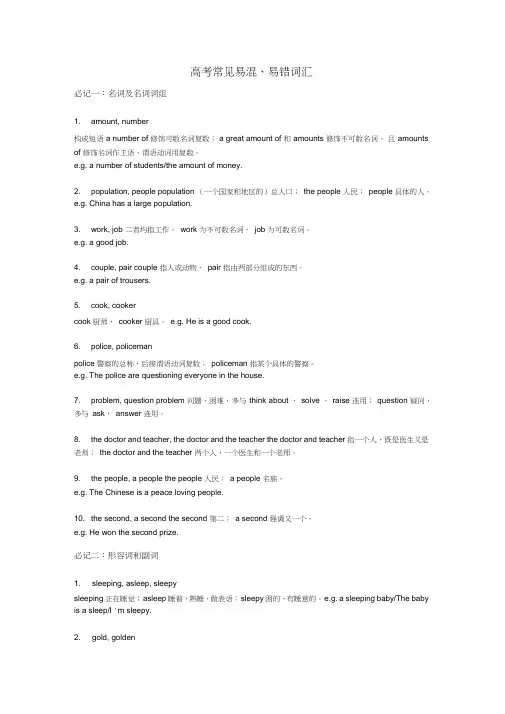
高考常见易混、易错词汇必记一:名词及名词词组1. amount, number构成短语a number of 修饰可数名词复数;a great amount of 和amounts 修饰不可数名词。
且amounts of 修饰名词作主语,谓语动词用复数。
e.g. a number of students/the amount of money.2. population, people population (一个国家和地区的)总人口;the people 人民;people 具体的人。
e.g. China has a large population.3. work, job 二者均指工作。
work 为不可数名词,job 为可数名词。
e.g. a good job.4. couple, pair couple 指人或动物,pair 指由两部分组成的东西。
e.g. a pair of trousers.5. cook, cookercook 厨师,cooker 厨具。
e.g. He is a good cook.6. police, policemanpolice 警察的总称,后接谓语动词复数;policeman 指某个具体的警察。
e.g. The police are questioning everyone in the house.7. problem, question problem 问题、困难,多与think about ,solve ,raise 连用;question 疑问,多与ask,answer 连用。
8. the doctor and teacher, the doctor and the teacher the doctor and teacher 指一个人,既是医生又是老师;the doctor and the teacher 两个人,一个医生和一个老师。
9. the people, a people the people 人民;a people 名族。
最易错的英语单词
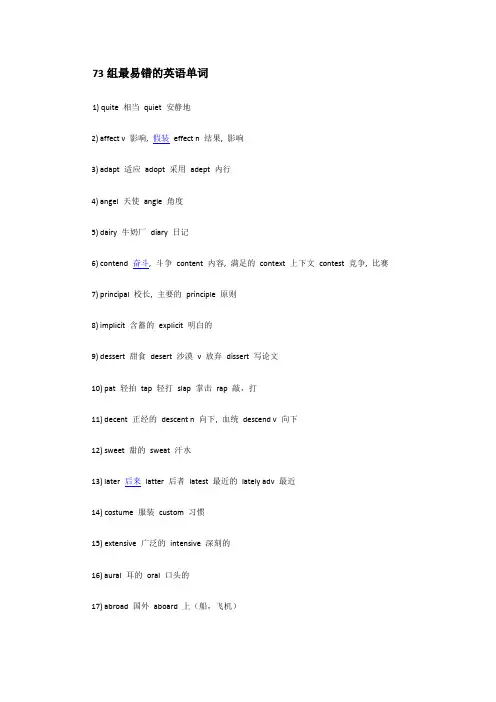
73组最易错的英语单词1) quite 相当quiet 安静地2) affect v 影响, 假装effect n 结果, 影响3) adapt 适应adopt 采用adept 内行4) angel 天使angle 角度5) dairy 牛奶厂diary 日记6) contend 奋斗, 斗争content 内容, 满足的context 上下文contest 竞争, 比赛7) principal 校长, 主要的principle 原则8) implicit 含蓄的explicit 明白的9) dessert 甜食desert 沙漠v 放弃dissert 写论文10) pat 轻拍tap 轻打slap 掌击rap 敲,打11) decent 正经的descent n 向下, 血统descend v 向下12) sweet 甜的sweat 汗水13) later 后来latter 后者latest 最近的lately adv 最近14) costume 服装custom 习惯15) extensive 广泛的intensive 深刻的16) aural 耳的oral 口头的17) abroad 国外aboard 上(船,飞机)18) altar 祭坛alter 改变19) assent 同意ascent 上升accent 口音20) champion 冠军champagne 香槟酒campaign 战役21) baron 男爵barren 不毛之地的barn 古仓22) beam 梁,光束bean 豆been have 过去式23) precede 领先proceed 进行,继续24) pray 祈祷prey 猎物25) chicken 鸡kitchen 厨房26) monkey 猴子donkey 驴27) chore 家务活chord 和弦cord 细绳28) cite 引用site 场所sight 视觉29) clash (金属)幢击声crash 碰幢,坠落crush 压坏30) compliment 赞美complement 附加物31) confirm 确认conform 使顺从32) contact 接触contract 合同contrast 对照33) council 议会counsel 忠告consul 领事34) crow 乌鸦crown 王冠clown 小丑cow 牛35) dose 一剂药doze 打盹36) drawn draw 过去分词drown 溺水37) emigrant 移民到国外immigrant 从某国来的移民38) excess n 超过exceed v超过excel 擅长39) hotel 旅店hostel 青年旅社40) latitude 纬度altitude 高度gratitude 感激41) immoral 不道德的immortal 不朽的42) lone 孤独的alone 单独的lonely 寂寞的43) mortal 会死的metal 金属mental 神经的medal 勋章model 模特meddle 玩弄44) scare 惊吓scarce 缺乏的45) drought 天旱draught 通风, 拖拉draughts (英)国际跳棋47) assure 保证ensure 使确定insure 保险48) except 除外expect 期望accept 接受excerpt 选录exempt 免除49) floor 地板flour 面粉50) incident 事件accident 意外51) inspiration 灵感aspiration 渴望52) march 三月, 前进match 比赛53) patent 专利potent 有力的potential 潜在的54) police 警察policy 政策politics 政治55) protest 抗议protect 保护56) require 需要inquire 询问enquire 询问acquire 获得57) revenge 报仇avenge 为...报仇58) story 故事storey 楼层store 商店59) strike 打stick 坚持strict 严格的60) expand 扩张expend 花费extend 延长61) commerce 商业commence 开始62) through 通过thorough 彻底的(al)though 尽管thought think 过去分词63) purpose 目的suppose 假设propose 建议64) expect 期望respect 尊敬aspect 方面inspect 视察suspect 怀疑65) glide 滑翔slide 使滑行slip 跌落66) steal 偷steel 钢67) strive 努力stride 大步走68) allusion 暗示illusion 幻觉delusion 错觉elusion 逃避69) prospect 前景perspective 透视法70) stationery 文具stationary 固定的71) loose 松的lose 丢失loss n 损失lost lose过去式72) amend 改正, 修正emend 校正73) amoral 与道德无关的unmoral immoral 同义不道德的amoral。
英语易错词词汇表
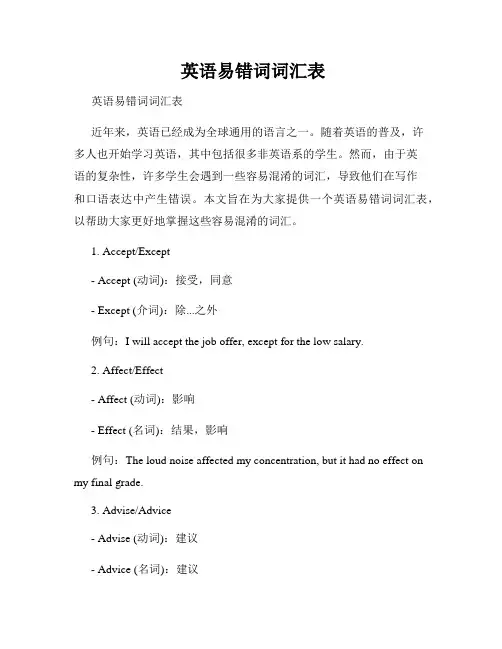
英语易错词词汇表英语易错词词汇表近年来,英语已经成为全球通用的语言之一。
随着英语的普及,许多人也开始学习英语,其中包括很多非英语系的学生。
然而,由于英语的复杂性,许多学生会遇到一些容易混淆的词汇,导致他们在写作和口语表达中产生错误。
本文旨在为大家提供一个英语易错词词汇表,以帮助大家更好地掌握这些容易混淆的词汇。
1. Accept/Except- Accept (动词):接受,同意- Except (介词):除...之外例句:I will accept the job offer, except for the low salary.2. Affect/Effect- Affect (动词):影响- Effect (名词):结果,影响例句:The loud noise affected my concentration, but it had no effect on my final grade.3. Advise/Advice- Advise (动词):建议- Advice (名词):建议例句:I would advise you to take his advice into consideration.4. Loose/Lose- Loose (形容词):松散的- Lose (动词):丢失,失去例句:Be careful, or you might lose your loose change.5. Principle/Principal- Principle (名词):原则,原理- Principal (名词):校长,负责人例句:He is a man of principles, and the principal of the school.6. Complement/Compliment- Complement (名词):补充物- Compliment (名词/动词):称赞例句:The wine was the perfect complement to the meal. She gave hima compliment on his new haircut.7. Its/It's- Its (代词):它的- It's (缩写,代替"It is"):它是例句:The dog wagged its tail. It's a nice day today.8. Stationary/Stationery- Stationary (形容词):静止的,不动的- Stationery (名词):文具例句:She bought some new stationery for her office. The car was stationary at the red light.9. Weather/Whether- Weather (名词):天气- Whether (连词):是否例句:The weather forecast predicts rain tomorrow. I am not sure whether I should go or stay.10. Than/Then- Than (连词):比- Then (副词):然后,那时例句:He is taller than his brother. Finish your homework, and then you can go play.以上是一些常见的英语易错词汇及其用法解释。
专四词汇语法易错
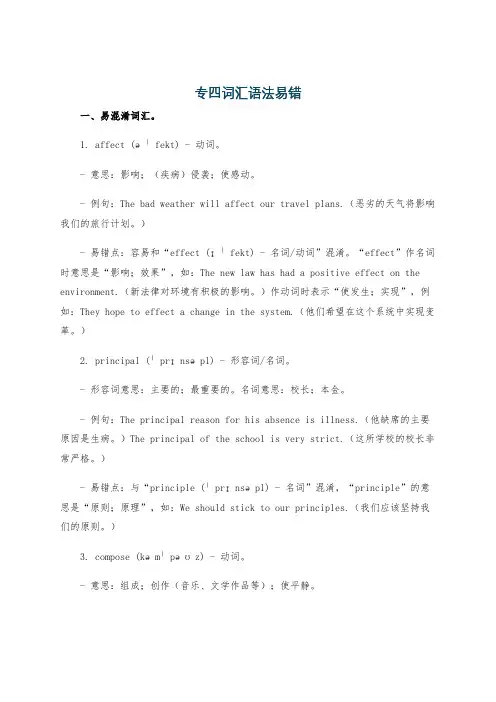
专四词汇语法易错一、易混淆词汇。
1. affect (əˈfekt) - 动词。
- 意思:影响;(疾病)侵袭;使感动。
- 例句:The bad weather will affect our travel plans.(恶劣的天气将影响我们的旅行计划。
)- 易错点:容易和“effect (ɪˈfekt) - 名词/动词”混淆。
“effect”作名词时意思是“影响;效果”,如:The new law has had a positive effect on the environment.(新法律对环境有积极的影响。
)作动词时表示“使发生;实现”,例如:They hope to effect a change in the system.(他们希望在这个系统中实现变革。
)2. principal (ˈprɪnsəpl) - 形容词/名词。
- 形容词意思:主要的;最重要的。
名词意思:校长;本金。
- 例句:The principal reason for his absence is illness.(他缺席的主要原因是生病。
)The principal of the school is very strict.(这所学校的校长非常严格。
)- 易错点:与“principle (ˈprɪnsəpl) - 名词”混淆,“principle”的意思是“原则;原理”,如:We should stick to our principles.(我们应该坚持我们的原则。
)3. compose (kəmˈpəʊz) - 动词。
- 意思:组成;创作(音乐、文学作品等);使平静。
- 例句:Water is composed of hydrogen and oxygen.(水由氢和氧组成。
)He can compose beautiful music.(他能创作优美的音乐。
)- 易错点:容易和“comprise (kəmˈpraɪz) - 动词”弄混。
(完整版)初中常见易混淆英语词汇
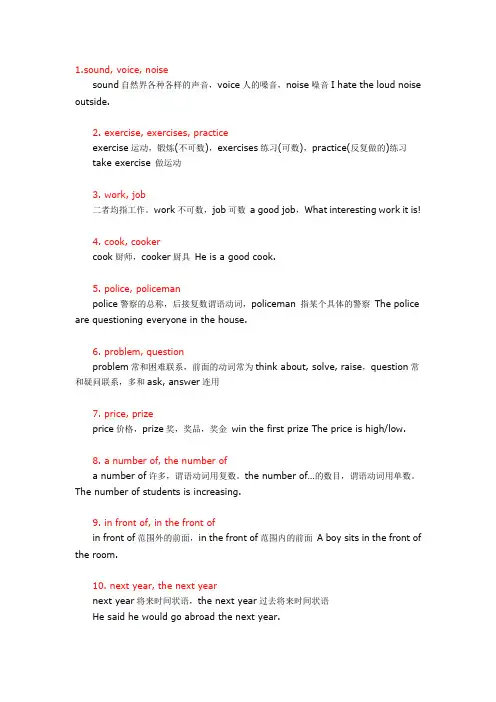
1.sound, voice, noisesound自然界各种各样的声音,voice人的嗓音,noise噪音I hate the loud noise outside.2. exercise, exercises, practiceexercise运动,锻炼(不可数),exercises练习(可数),practice(反复做的)练习take exercise 做运动3. work, job二者均指工作。
work不可数,job可数a good job,What interesting work it is!4. cook, cookercook厨师,cooker厨具He is a good cook.5. police, policemanpolice警察的总称,后接复数谓语动词,policeman 指某个具体的警察The police are questioning everyone in the house.6. problem, questionproblem常和困难联系,前面的动词常为think about, solve, raise,question常和疑问联系,多和ask, answer连用7. price, prizeprice价格,prize奖,奖品,奖金win the first prize The price is high/low.8. a number of, the number ofa number of许多,谓语动词用复数。
the number of…的数目,谓语动词用单数。
The number of students is increasing.9. in front of, in the front ofin front of范围外的前面,in the front of范围内的前面A boy sits in the front of the room.10. next year, the next yearnext year将来时间状语,the next year过去将来时间状语He said he would go abroad the next year.11. in bed, on the bedin bed卧在床上,on the bed在床上The book is on the bed. He is ill in bed.12. the people, a peoplethe people指人,a people指民族The Chinese is a peace-loving people.13. it, oneit同一物体,one同类不同一I lost my pen. I have to buy a new one.14. that, thisthat指代上文所提到的,this导出下文所要说的I was ill. That's why…15. none, nothing, no onenone强调有多少,nothing, no one强调有没有,nothing指物,no one指人--- How many…/How much…? --- None.16. anyone, any oneanyone指人,不能接of,any one指人/物均可,可接of, any one of you17. who, whatwho指姓名或关系,what指职业或地位What is your dad? He is a teacher.18. what, whichwhat的选择基础是无限制的,which在一定范围内进行选择Which do you prefer, bananas or apples?19. other, anotherother后接名词复数,another后接名词单数other students, another student20. many, much, a lot ofmany和可数名词连用,much和不可数名词连用,a lot of可数,不可数均可,但不用于否定句I haven't many books.21. much more…than, many more…thanmuch more…than后接形容词或不可数名词,many more…than后接可数名词many more people, much more water, much more beautiful22. no, notno=not a/any, no friend=not a/any friend, no water=not any water23. by oneself, for oneself, to oneselfby oneself单独的,独自的,for oneself为自己,to oneself供自己用的24. at all, after allat all根本,全然, after all到底,毕竟After all he is a child.25. tall, hightall常指人或动物,high常指物体He is tall.26. fast, quicklyfast侧重于指人或物体具有运动速度快的特点,quickly侧重指某事完成或发生的快run fast, answer the question quickly27. high, highlyhigh具体的高,highly抽象的高,高度的think highly of(高度赞扬)28. sleeping, asleep, sleepysleeping正在睡觉,asleep睡着,熟睡,只能做表语,sleepy困的,有睡意的a sleeping baby,The baby is asleep. I'm sleepy.29. real, truereal真的,真实的,指的是事实上存在而不是想象的,true真的,真正的,指的是事实和实际情况相符合real gold, a true story30. pleasant, pleased, pleasingpleasant常用作定语,pleased常用作表语,pleased主语常为人,a pleasant trip,be pleased with…对…感到满意/开心31. ill, sickill做表语,sick定语、表语均可a sick boy, He is sick/ill.32. good, wellgood形容词,well副词,但指身体状况是形容词He is well again.33. hard, hardlyhard努力,hardly几乎不work hard, I can hardly believe it.34. excited, excitingexcited使人兴奋的,exciting令人兴奋的I'm excited. The news is exciting.35. before long, long beforebefore long不久以后,long before很久以前36. happy, gladhappy高兴,幸福,定表均可,glad高兴,只能做表语a happy girl, I’m happy/ glad to see you.37. instead, instead ofinstead是副词,放在句首或句末,instead of是介词短语,放在句中He didn't see a film. Instead he watched TV. He watched TV instead of seeing a film.38. too much, much tootoo much 后接不可数名词,much too后接形容词much too heavy39. raise, riseraise及物动词,rise不及物动词The sun rises in the east. Raise your hand, please.40. bring, take, carry, fetchbring拿来,take带走,carry随身携带,fetch去回这一往返动作fetch a box of chalk41. spend, take, pay, costspend人做主语,花钱,花时间; s pend…on sth./(in) doing sth; take物做主语,花时间; It takes sb some time to do sth.; pay人做主语,花钱,pay for; cost物做主语,花钱;sth cost some money42. join, join in, take part injoin加入某个组织,并成为其中的一员;join in参加小型的活动, join sb. in;take part in 参加大型的活动He joined the army five years ago.43. learn, studylearn学习,侧重学习的结果,study学习,侧重学习的过程,研究study the problem44. want, hope, wishwant打算,想要,want to do, want sb. to do, hope希望(通常可以实现),hope to do/ hope that… wish希望(通常不能实现)wish (sb.) to do, wish sb/sth. + n. I wish you success.45. answer, replyanswer及物动词,reply不及物动词,后接to, reply to the letter46. leave, leave forleave离开,leave for前往He left Beijing for Shanghai.47. drop, falldrop及物\不及物均可,fall不及物动词Prices fell/dropped. He dropped his voice.48. win, lose, beatwin后接sth.,反义词为lose, beat后接sb. win the game, beat them49. live on, live bylive on以…为主食,live by靠…谋生live on fish/ live by fishing50. catch a cold, have a coldcatch a cold不能和表示"一段时间"的状语连用,而have a cold可以She has had a cold for a week.51. change for, change intochange for调换成,change into变成Change the shirt for a bigger one. Water changes into ice.52. go for a doctor, go to a doctorgo for a doctor去请医生,go to a doctor去看病53. arrive, get, reacharrive不及物动词,后接in (大地点),at(小地点),get不及物动词后接to,reach及物动词arrive in Beijing, get to Beijing, reach Beijing54. agree with, agree to,agree with同意某人,agree to同意某事,agree with you, agree to the plan, agree to do sth55. receive, acceptreceive收到某一东西,但不一定接受,accept接受I received a gift, but I didn't accept it.56. wear, put on, dresswear和dress表状态,wear接衣服等,可用进行时,dress接人,be dressed in, put on表动作It's cold outside. Put on your warm clothes.57. listen, hearlisten强调动作,hear强调结果I listened, but I heard nothing.58. look, see, watchlook看的动作,see看的结果,watch强调所看物体的变化、移动和发展watch TV59. lie, laylie躺,位于(lay, lain),说谎(lied, lied),lay平放(laid, laid) lay the book60. turn, get, growturn表突变,后常接表颜色的词,get强调变的结果,grow强调过程,逐渐的变化turn yellow, get tired, grow big61. close, shut, turn offclose和shut当关解时可以通用,用于可开合的物体,turn off用于指有开关的物体Close/Shut the door. Turn off the TV.62. at, in (表地点)at小地点,in大地点arrive at a small village, arrive in Shanghai63. day after day, day by dayday after day日复一日(无变化);day by day一天天地(有变化)Trees grow taller day by day.64. after, in (表时间)after接时间点,in接时间段,用于将来时after 7:00, in five minutes65. between, amongbetween两者之间,三者或三者以上两两之间, among三者或三者以上之间Switzerland lies between France, Germany, Australia and Italy.66. through, acrossthrough穿越空间,across在…上穿过through the forest, across the desert67. above, on, overabove在上面,不接触,on在上面,接触,over在正上方fly over the hill68. until, not…untiluntil到…为止,not…until直到…才(常跟点动词连用)I waited until 3:00.He didn't come until 3:00.69. besides, exceptbesides除了…还(包括在内)except除了(不包括在内),70. because, because ofbecause连词,连接两句话,because of后接词或短语He didn't go to school because of his illness.71. for example, such asfor example一般只列举一个,such as列举多个例子I have been to a lot of American cities, such as New York, Atlanta and Chicago.72. All right. That's all right. That's right.All right好吧;That's all right.没关系;That's right. 那是对的---Sorry. --- That's all right.73. such…that, so…that当如此…以至于解时,such…that修饰名词,so…that修饰形容词或副词,但名词前面如果有many, much, little, few修饰用so…that,不用such thatso many people that… such a lovely boy=so lovely a boy74. Shall I…? Will you…?Shall I…? 征求对方意见或向对方请示,意为我能…吗? Will you…?请求或建议对方做某事,意为你愿意…吗? Will you help me? Yes, I will.。
中考易拼错单词
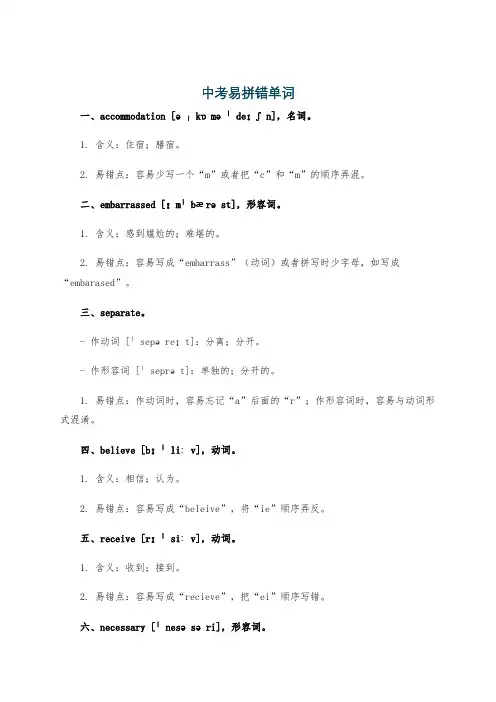
中考易拼错单词
一、accommodation [əˌkɒməˈdeɪʃn],名词。
1. 含义:住宿;膳宿。
2. 易错点:容易少写一个“m”或者把“c”和“m”的顺序弄混。
二、embarrassed [ɪmˈbærəst],形容词。
1. 含义:感到尴尬的;难堪的。
2. 易错点:容易写成“embarrass”(动词)或者拼写时少字母,如写成“embarased”。
三、separate。
- 作动词 [ˈsepəreɪt]:分离;分开。
- 作形容词 [ˈseprət]:单独的;分开的。
1. 易错点:作动词时,容易忘记“a”后面的“r”;作形容词时,容易与动词形式混淆。
四、believe [bɪˈliːv],动词。
1. 含义:相信;认为。
2. 易错点:容易写成“beleive”,将“ie”顺序弄反。
五、receive [rɪˈsiːv],动词。
1. 含义:收到;接到。
2. 易错点:容易写成“recieve”,把“ei”顺序写错。
六、necessary [ˈnesəsəri],形容词。
1. 含义:必要的;必需的。
2. 易错点:容易写成“neccessary”,多写一个“c”。
七、government [ˈɡʌvənmənt],名词。
1. 含义:政府。
2. 易错点:容易写成“goverment”,少写一个“n”。
中考初中英语易混易错词汇总结
中考初中英语易混易错词汇总结第一部分:易用错的词1. clothes, cloth, clothingclothes统指各种衣服,谓语动词永远是复数,cloth指布,为不可数名词clothing服装的总称,指一件衣服用a piece of, an article of2. amount, numberamount后接不可数名词,number后接可数名词a number of students3. family, house, homehome家,包括住处和家人,house房子,住宅,family家庭成员. My family is a happy one.4. sound, voice, noisesound自然界各种各样的声音,voice人的嗓音,noise噪音I hate the loud noise outside.5. photo, picture, drawingphoto用照相机拍摄的照片,picture可指相片,图片,电影片,drawing画的画Let's go and see a good picture.6. vocabulary, wordvocabulary词汇,一个人拥有的单词量,word具体的单词He has a large vocabulary.7. population, peoplepopulation人口,人数,people具体的人China has a large population.8. road, street, path, wayroad具体的公路,马路,street街道,path小路,小径,way道路,途径take this road; in the street, show me the way to the museum.9. course, subjectcourse课程(可包括多门科目),subject科目(具体的学科)a summer course10. custom, habitcustom传统风俗,习俗,也可指生活习惯,后接to do,habit生活习惯,习惯成自然,后接of doing. I've got the habit of drinking a lot.11. cause, reasoncause指造成某一事实或现象的直接原因,后接of sth./doing sth,reason用来解释某种现象或结果的理由,后接for sth./doing sth. the reason for being late12. exercise, exercises, practiceexercise运动,锻炼(不可数),exercises练习(可数),practice(反复做的)练习Practice makes perfect.13. class, lesson作"课"解时,两者可以替换.指课文用lesson.指班级或全体学生用class. lesson 6; class 5 14. speech, talk, lecturespeech指在公共场所所做的经过准备的较正式的演说,talk日常生活中的一般的谈话,讲话,lecture学术性的演讲,讲课 a series of lecture on…15. officer, officialofficer部队的军官,official政府官员an army officer16. work, job二者均指工作。
易混易错的英语单词
外教一对一易混易错的英语单词在英语单词中,同一单词不同的读音会有不同的语义,容易发生混淆。
例如:conjure[’kAnd3a] practice sorcery,to call up by magic念咒召唤;用魔法变出conjurer施魔法的人,念咒语者,变戏法的人conjure[ kan'd3ua]祈求、恳求A walk in the fresh air soon conjured her headache away.在新鲜空气中散步奇迹般地消除了她的头痛。
The conjurer waved his magic wand and pulled a rabbit out of the hat.魔术师挥动魔棒,便从帽子里拉出一只兔子。
又如:slough[ slau]n.a marshy,muddy place泥塘,沼泽地slough[ slAf]n.蛇蜕的皮;(动物身上)按时脱落的部分秽.崩塌,丢弃(后面常跟off)He saved her from tIe slough of despond.他把她从绝望的深渊中拯救了出来。
Forego exfoliating treatments at a spa and whip up your own: Mix ahandful of coarse sugar crystals with some olive oil, and use to slough offdead skin in the shower.在去矿泉疗养院做去死皮治疗前,可自己动手护理一下:可将一把粗糖放人橄榄油内搅拌,然后在淋浴时用搅拌液搓去身上的死皮。
How it works: Papaya contains papain, an exfoliant that helps sloughdead skin.作用:番木瓜含有木瓜蛋白酶,一种有助于皮屑脱落的物质。
还有的单词拼写不同,但读音相同,词义则完全不同,例如complement和compliment;indict和indite等等。
中考易混淆单词词组汇总
中考易混淆单词词组汇总一、单词部分。
1. accept [əkˈsept] (v.) - 接受。
- 例句:I accept your invitation.(我接受你的邀请。
)2. except [ɪkˈsept] (prep.) - 除……之外。
- 例句:Everyone is here except Tom.(除了汤姆,大家都在这儿。
)3. alive [əˈlaɪv] (adj.) - 活着的,有生气的(作表语或后置定语)- 例句:The fish is still alive.(这条鱼还活着。
)4. living [ˈlɪvɪŋ] (adj.) - 活着的(可作表语和定语),n. 生活,生计。
- 例句:He is one of the greatest living writers.(他是在世的最伟大的作家之一。
)- 例句:make a living(谋生)5. alone [əˈləʊn] (adj. / adv.) - 单独的(地),独自的(地)(强调独自一人的状态)- 例句:He lives alone.(他独自生活。
)6. lonely [ˈləʊnli] (adj.) - 孤独的,寂寞的(带有感情色彩)- 例句:The old man feels lonely.(这位老人感到孤独。
)7. beside [bɪˈsaɪd] (prep.) - 在……旁边。
- 例句:Sit beside me.(坐在我旁边。
)8. besides [bɪˈsaɪdz] (prep. / adv.) - 除……之外(还有),此外。
- 例句:Besides English, we also learn French.(除了英语,我们还学法语。
)- 例句:I don't like this dress. Besides, it's too expensive.(我不喜欢这条裙子。
它太贵了。
初中英语易混易错词汇辨析100组!分清楚非常有利于选择和填空!
初中英语易混易错词汇辨析100组!分清楚非常有利于选择和填空!展开全文英语里有很多容易混淆的词语在考试中极其容易出错,那么下面就跟着老师来看看,究竟是哪些英语容易出错,以后多加注意,在考试中更加仔细地答题吧。
希望每个人都能取得好成绩!1. clothes, cloth, clothingclothes统指各种衣服,谓语动词永远是复数,cloth指布,为不可数名词 clothing 服装的总称,指一件衣服用a piece of, an article of2. amount, numberamount后接不可数名词, number后接可数名词 a number of students3. sound, voice, noisesound自然界各种各样的声音,voice人的嗓音,noise噪音I hate the loud noise outside.4. cause, reasoncause 指造成某一事实或现象的直接原因,后接of sth./doing sth,reason用来解释某种现象或结果的理由,后接for sth./doing sth. the reason for being late5. exercise, exercises, practiceexercise运动,锻炼(不可数),exercises练习(可数),practice(反复做的)练习 Practice makes perfect.6. officer, officialofficer部队的军官,official政府官员 an army officer7. work, job二者均指工作。
work不可数,job可数 a good job8. cook, cookercook厨师,cooker厨具 He is a good cook.9. problem, questionproblem常和困难连系,前面的动词常为think about, solve, raise,question常和疑问连系,多和ask, answer连用10. a number of, the number ofa number of许多,谓语动词用复数。
- 1、下载文档前请自行甄别文档内容的完整性,平台不提供额外的编辑、内容补充、找答案等附加服务。
- 2、"仅部分预览"的文档,不可在线预览部分如存在完整性等问题,可反馈申请退款(可完整预览的文档不适用该条件!)。
- 3、如文档侵犯您的权益,请联系客服反馈,我们会尽快为您处理(人工客服工作时间:9:00-18:30)。
Break
break away from打破,脱离,挣脱,改掉 打破, 打破 脱离,挣脱, break down出毛病,身体 精神 衰弱,分解, 出毛病, 精神)衰弱 出毛病 身体(精神 衰弱,分解, 拆开 break off暂停,中断 暂停, 暂停 break in强行进入,插话 强行进入, 强行进入 break into闯入 闯入 break into pieces成为碎片 成为碎片 break out爆发 爆发 break up捣碎,驱散,瓦解,学期结束,拆散 捣碎, 捣碎 驱散,瓦解,学期结束, break through突破 突破
consist in 在于,存在于 在于, consist with 一致,符合 一致,
consist of 由…组成 组成
Her charm does not consist only in her beauty. 她的魅力不仅在于她的美貌。 The committee consists of nine members. 这个委员会由九个会员组成。 Health does not consist with intemperance. 健康与纵欲不相容。
stand up for 要求并坚持享有某种权利,支 持、拥护某人、某件事或某项事业 stand up to 勇敢地面对(困难、危险、敌人 等),勇敢抵抗某人或某事,(物品或人体 等)经得起、耐得住压力、考验或磨损 They are determined to stand up for their rights.他们决心维护自己的权利。 This type of building stands up to the gales very well.这种建筑物经得起大风暴的袭击。
go against sb.对某人不利,不利于某人 对某人不利, 对某人不利 go against sth.违反,与…不符(或相反) 违反, 不符(或相反) 违反 不符 go around/round 旋转,转动;足够分给 旋转,转动; 每个人;习惯于;传播 每个人;习惯于; go along with sb./sth. 赞同某事,和某人 赞同某事, 观点一致 go after sb./sth. 追求某人,谋求某事或某 追求某人, 物
Take
take back 收回,接回,退回 收回,接回, take down写下,记下 拆下,拆掉 写下, 拆下, 写下 记下;拆下 take in收留 ;包括 理解 欺骗,使上当 包括;理解 欺骗, 收留 包括 理解;欺骗 take off脱下 起飞 ;打折扣,扣掉,去 脱下;起飞 打折扣 扣掉, 打折扣, 脱下 请假, 掉;请假,休息 请假
take on 聘用,雇用 ;呈现,显现,具有 承 聘用, 呈现, 呈现 显现,具有;承 担或担任(工作或责任等 工作或责任等) 担或担任 工作或责任等 take over接替,接管,继承 接替, 接替 接管, take up 开始 学习或从事等 继续 占去 时 开始(学习或从事等 继续;占去 学习或从事等);继续 占去(时 间或空间);接纳 乘客等),接受(挑战 建议, 接纳(乘客等 挑战, 间或空间 接纳 乘客等 ,接受 挑战,建议, 条件等);提出 商讨), 提出(商讨 条件等 提出 商讨 ,讨论
pl. They live chiefly on rice.他们以米饭为主 他们以米饭为主 食。 The kind of bird feeds on worms. 这种鸟吃昆虫。 这种鸟吃昆虫。 She lives by running a small shop. 她靠经营一家小商店生活。 她靠经营一家小商店生活。 He told them to live off the mountain. 他告诉他们要靠山吃山。 他告诉他们要靠山吃山。
Send
send for派人去请 派人去请 send off送行 送行 send out发出(光亮)等 发出(光亮) 发出 send up发射 发射
Go
go in for 参加 考试、比赛等 ; 从事 某一 参加(考试 比赛等); 从事(某一 考试、 职业等); 爱好, 职业等 ; 爱好,喜欢 go into 到达,进入,从事,参加 ; 调查, 到达,进入,从事, 调查, 研究, 研究,弄清楚 go out 出去; 出国,远行; 熄灭 出去; 出国,远行; go over 复习、温习、演习; 检查、查看、 复习、温习、演习; 检查、查看、 核对
Call
call on号召,拜访(某人) 号召, 号召 拜访(某人) call at拜访 .... 、参观(某地) 参观(某地) 拜访 call for去叫某人 要求 需要 去叫某人, 去叫某人 要求, call up使回忆起 征召入伍 使回忆起, 使回忆起 call in召集,请某人来 召集, 召集 call out大喊,高叫 大喊, 大喊 call off取消,不举行 取消, 取消
单选题中常见易混淆单词、词组 单选题中常见易混淆单词、
beneficial 有益的
beneficent 仁慈的
Fresh air is beneficial to health. The kind-hearted man is beneficent to the poor.
desirable 称心合意的 desirous 渴望的,希望的 渴望的, He is the desirable man for the position. She is desirous of seeing him again.
Hold
hold back阻止,隐瞒 阻止, 阻止 hold up举起,使停顿 举起, 举起 hold on别挂电话,等,坚持 别挂电话, 别挂电话 hold out持续,坚持,伸出 持续, 持续 坚持, hold down控制,镇压 控制, 控制
Knock
knock at/on敲 敲 knock into撞到某人身上 撞到某人身上 knock down撞倒 撞倒 knock out of把…敲出 把 敲出 knock over撞倒 撞倒 knock off停止工作,休息 停止工作, 停止工作
live on 以…为食,靠…生活【可用于人或动物, 为食, 生活【 为食 生活 可用于人或动物, on后跟名词,可以是食物、工资】 后跟名词, 后跟名词 可以是食物、工资】 feed on 后跟名词,一般用于指动物 后跟名词, live by 靠…生活,后跟名词或动名词,指生存 生活, 生活 后跟名词或动名词, 的方式 live off 常以地点名词作宾语,强调生活来源 常以地点名词作宾语, 注:不强调来源时,live on 和 live off 可换用 不强调来源时,
He doesn’t want to part with the car. She parted from Jim at sunset.
她在日暮时与吉姆告别。
prohibit和forbid 和 都为“禁止”,均为及物动词,用法不同 prohibit+宾语+from doing sth forbid+宾语+不定式 They prohibited children from swimming in the river. They forbade children to swim in the river. 他们禁止儿童在那条河里游泳。Thank you源自improve in 改进
improve on/upon 比…好 好
He is certainly improving in his spelling. The second edition greatly improves on the first edition. part with 放弃,出让 放弃, part from 与…分别 分别
